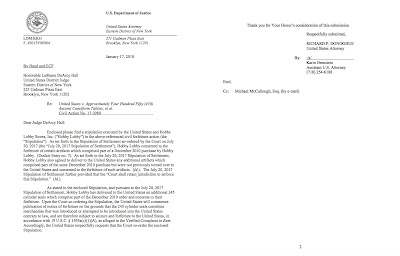Saturday, January 20, 2018 -  Antiquities; Looting; Smuggling; Collecting; Collections,Collecting,collecting history,conservation,Green Hobby Lobby,illicit trafficking,Museum of the Bible,Scott Carroll. ethical collecting
Antiquities; Looting; Smuggling; Collecting; Collections,Collecting,collecting history,conservation,Green Hobby Lobby,illicit trafficking,Museum of the Bible,Scott Carroll. ethical collecting
 1 comment
1 comment
 Antiquities; Looting; Smuggling; Collecting; Collections,Collecting,collecting history,conservation,Green Hobby Lobby,illicit trafficking,Museum of the Bible,Scott Carroll. ethical collecting
Antiquities; Looting; Smuggling; Collecting; Collections,Collecting,collecting history,conservation,Green Hobby Lobby,illicit trafficking,Museum of the Bible,Scott Carroll. ethical collecting
 1 comment
1 comment
Hobby Lobby turns over more artifacts to federal prosecutors in New York
 |
| Image Credit: US Dept of Justice |
According to documents released by the US Federal authorities, officials affiliated with Hobby Lobby, the American craft-supply mega-chain, have relinquished another 245 ancient cylinder seals (in some articles it has been misquoted that the forfeiture included cuneiform tablets), originating from ancient Mesopotamia, to a storage facility within the Eastern District of New York on Wednesday, January 17, 2018.
According to the letter signed by United States Attorney Richard Donoghue and Assistant U.S. Attorney Karin Orenstein, the forfeited items, from the zone of modern day Iraq
“constitute merchandise that was introduced or attempted to be introduced into the United States contrary to law, and are therefore subject to seizure and forfeiture to the United States, in accordance with 19 U.S.C. § 1595a(c)(1)(A),”
This new forfeiture was done by way of an earlier settlement and decree of forfeiture between the the United States of America and Hobby Lobby Stores, Inc., dating to June 29, 2017 related to "The United States of America v. Approximately Four Hundred Fifty (450) Ancient Cuneiform Tablets; and Approximately Three Thousand (3,000) Ancient-Clay Bullae"
As noted in documents related to that civil forfeiture agreement, Hobby Lobby president, and evangelical benefactor, Steve Green, through his designated buyers, began building a substantial private collection of antiquities in anticipation of the opening the the Green-sponsored $800 million, eight-story Museum of the Bible, which later opened this past November.
According to the Museum of the Bible website, the Green's purchased their first biblical object in November 2009. Since that time, their private collection has grown to an accelerated rate to an estimated 40,000 objects which includes Dead Sea Scroll fragments, biblical papyri, rare biblical texts and manuscripts, cuneiform tablets, Torah scrolls, and rare printed Bibles.
On one of the Green's authorised purchasing trips in July 2010 to the UAE, in which Green himself attended, Hobby Lobby negotiated the purchase of
"5,548 distinct artifacts: 1,500 cuneiform tablets, 500 cuneiform bricks, 3,000 clay bullae, 35 clay envelope seals, 13 extra-large cuneiform tablets and 500 stone cylinder seals." [page eight]
paying $1.6 million despite the lack of accompanying legitimate paperwork and the likely plundered origin of the artifacts. The procured antiquities were then shipped to the purchaser in multiple shipments via Federal Express to Oklahoma City to various different destination addresses affiliated with Hobby Lobby and its subsidiaries.
Five of these shipments, however, were intercepted in transit between January 3rd and January 5th 2011 and were found to have been falsely labeled as "Ceramic Tiles" or "Tiles (Sample)" [pages 13-14] misidentifying the contents of the packages so that the artifacts instead appeared to be simply arts and crafts items.
As the importation of cultural property into the United States in violation of a foreign country’s patrimony law (in this case Iraq) violates the National Stolen Property Act, codified at Title 18, United States Code, Section 2314, et seq. the objects were seized by federal authorities and an investigation was initiated.
As an outcome of that US Federal investigation, Hobby Lobby agreed to hand over 5,548 smuggled artifacts in July 2017 and the firm was heavily criticized by both academics and the general public for supporting the illicit trade through its unethical purchase of antiquities.
The June 2017 stipulation of settlement between Hobby Lobby and the United States stated that:
"in the event that any of the Artifacts not included in the Defendants in rem were to “come into [Hobby Lobby’s] physical custody or control, whether inside or outside of the United States, [then] Hobby Lobby will immediately notify the Office and arrange for such Artifacts to be delivered to a place to be designated by the [United States] at Hobby Lobby’s sole expense." [page eight]
Where are the remaining 1709 objects Hobby Lobby has agreed to hand over?
In 2017, according to documentation filed with the US Federal Courts in July 2017, Hobby Lobby relinquished 3,594 clay bullae, cylinder seals, cuneiform tablets and other Near Eastern artifacts out of a total of over 5,500 documented in the same purchase. This weeks additional 2018 forfeiture of 245 cylinder seals brings the total number of artefacts relinquished to date by Hobby Lobby to only 3,839 objects.
Equally important, when will the Museum of the Bible answer scholars who have been posing questions for several years about the provenance and authenticity of additional key objects which remain part of, or are on display at the newly opened Museum of the Bible.
One of these, a Galations coptic papyrus fragment, was once on sale in 2012 via a dubious seller on eBay before being spotted at the Green’s Vatican exhibit Verbum Domini II in 2014. Until now, despite numerous requests from University of Manchester scholar Roberta Mazza dating as far back as 2014, the Museum of the Bible has declined all requests to clarify how and from whom this trafficked fragment and ca. 1,000 papyrus fragments and the other Egyptian objects in the collection were acquired.
By: Lynda Albertson
For more on the collection practices of the Green family and its former associates please see these previous ARCA articles.



1 comments:
Interesting. Though the real crime against art is turning these over to the U.S. Government to have them stored away somewhere or auctioned-off in a lot to some obscure buyer as opposed to have them preserved and displayed in a museum ofr museums.
Post a Comment